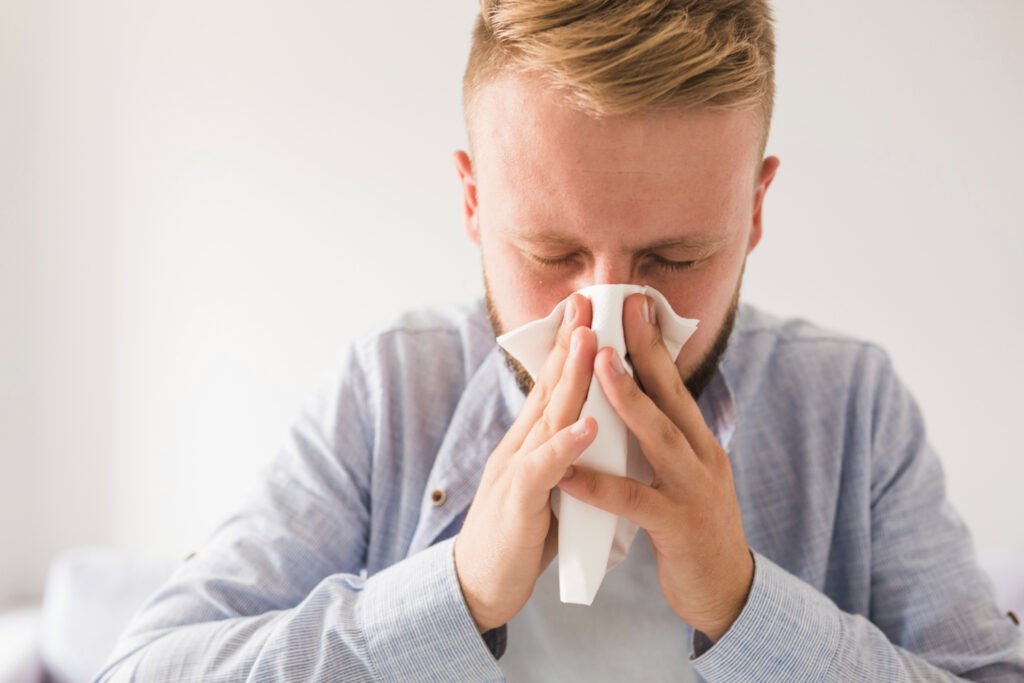
Overview
Allergies are a widespread condition where the immune system reacts defensively to typically harmless substances. These substances, known as allergens, can range from foods and medications to environmental elements. While some allergies cause mild discomfort, others can lead to severe, life-threatening reactions such as anaphylaxis. Understanding the symptoms, causes, and management of allergies is crucial for maintaining good health and preventing complications
What Are Allergies?
An allergy occurs when the immune system mistakenly identifies a harmless substance as harmful and overreacts. Upon exposure to the allergen, the immune system releases chemicals like histamine, leading to various symptoms. Allergies can affect people of all ages and may develop suddenly or over time.
Signs and Symptoms of Allergies
The symptoms of allergies vary depending on the allergen and the individual’s sensitivity. They can range from mild to severe.
Common Allergy Symptoms
- Sneezing
- Coughing
- Runny or congested nose
- Itchy, watery eyes
- Sore throat
Severe Allergy Symptoms
In extreme cases, allergic reactions may manifest as:
- Hives or rashes
- Swelling of the tongue or throat
- Difficulty breathing
- Rapid heartbeat or dizziness
Related : Lifestyle Advice for Heart Health
Anaphylaxis: A Medical Emergency
Anaphylaxis is a severe and life-threatening allergic reaction that requires immediate attention. Symptoms include:
- Difficulty breathing
- Rapid swelling of the face, throat, or tongue
- A sense of impending doom
- Fainting or dizziness
Immediate Action: Administer epinephrine (using an auto-injector) and seek emergency medical help.
Symptoms by Allergen Type
Food Allergy
Food allergies are among the most common types, particularly in children, though they can occur in adults.
Symptoms
- Swollen tongue
- Stomach cramps or vomiting
- Hives
- Wheezing
Common Food Allergens
- Dairy products
- Eggs
- Fish and shellfish
- Peanuts and tree nuts
- Soy
- Wheat
Food allergies can cause reactions within minutes or several hours after consumption.
Environmental Allergy
Environmental allergens, such as pollen, dust mites, and mold, are prevalent triggers.
Symptoms
- Nasal congestion
- Itchy nose, mouth, or throat
- Watery eyes
- Rash
Management Tips
Limit exposure to known allergens.
Use air purifiers and clean your living space regularly
Related : Foods and Drinks to Soothe a Sore Throat
Latex Allergy
Latex, commonly found in gloves and medical supplies, can cause allergic reactions ranging from mild irritation to severe symptoms.
Symptoms
- Skin irritation
- Swelling of the face or throat
Switching to latex-free alternatives is crucial for those with this allergy
Insect Allergy
Stings or bites from insects such as bees, wasps, or fire ants can trigger allergic reactions.
Symptoms
- Localized swelling
- Difficulty breathing
- Nausea
For severe insect allergies, always carry an epinephrine auto-injector
Medication Allergy

Some individuals experience allergic reactions to medications, particularly antibiotics like penicillin and nonsteroidal anti-inflammatory drugs (NSAIDs).
Symptoms
- Hives or itching
- Facial swelling
- Shortness of breath
It is essential to distinguish true allergies from medication side effects. Consult a healthcare provider for an accurate diagnosis
Causes and Mechanisms of Allergies
Allergic reactions occur when the immune system identifies harmless substances as threats and produces antibodies. These antibodies trigger mast cells to release chemicals, including histamine, leading to allergy symptoms
Types of Allergies
Related : How Much Sugar Should You Eat Per Day?
Skin Allergy
Triggered by allergens like latex, pollen, or certain plants, skin allergies can cause:
- Itchy rashes
- Flaking or peeling skin
Animal Allergy
Proteins in pet dander, saliva, or urine can lead to allergic reactions. Symptoms include:
- Sneezing
- Itchy eyes
- Nasal congestion
Insect Allergy
Insect stings or bites may cause localized or systemic reactions, including anaphylaxis in severe cases.
When to See a Doctor
- You should consult a healthcare provider if:
- Symptoms persist for more than a week.
- Over-the-counter allergy treatments are ineffective.
- Sudden, severe reactions occur.
An allergist can identify specific allergens and create a tailored treatment plan
Related : The Top Protein-Rich Nuts to Incorporate into Your Diet
Managing Allergies
Effective allergy management involves a combination of strategies:
- Avoiding Allergens
Identify and minimize exposure to triggers.
Read food labels carefully to avoid hidden allergens.
- Medication
Antihistamines: Relieve symptoms like itching and sneezing.
Decongestants: Reduce nasal congestion.
Corticosteroids: Manage inflammation for skin or nasal allergies.
- Epinephrine
For severe allergies, always carry an epinephrine auto-injector as prescribed.
- Lifestyle Adjustments
Use air purifiers to reduce indoor allergens.
Keep pets out of bedrooms if you have pet allergies.
Maintain a clean home environment.
Prevention Tips
- Allergy Testing: Identify allergens through professional tests.
- Immunotherapy: Undergo allergy shots to reduce sensitivity.
- Dietary Adjustments: Avoid foods known to trigger reactions
Related : Superfoods for Women
The Takeaway
Allergies are a common health condition that can significantly impact daily life. By understanding the types, symptoms, and management strategies, you can take proactive steps to minimize allergic reactions and improve your quality of life. Always consult a healthcare provider for proper diagnosis and treatment
Managing allergies effectively involves awareness, preparation, and adherence to medical advice. Stay vigilant about potential triggers and have a plan in place for emergencies to ensure safety and well-being
FAQs About Allergies
- What are allergies?
Allergies are an overreaction of the immune system to harmless substances known as allergens. These can include foods, pollen, dust, pet dander, or medications. The immune system mistakenly identifies these substances as harmful, triggering symptoms such as sneezing, itching, or more severe reactions like anaphylaxis.
- What are the most common types of allergies?
Common types of allergies include:
- Food allergies: Triggered by nuts, dairy, shellfish, eggs, etc.
- Environmental allergies: Caused by pollen, mold, dust mites, and pet dander.
- Medication allergies: Reactions to antibiotics or NSAIDs.
- Insect allergies: Reactions to bee stings or mosquito bites.
- Skin allergies: Contact dermatitis or eczema caused by latex or plants.
- How are allergies diagnosed?
Doctors use various methods to diagnose allergies, including:
- Skin prick tests: Small amounts of allergens are introduced to the skin to observe reactions.
- Blood tests: Measure IgE antibody levels to specific allergens.
- Elimination diets: Identify food allergies by systematically removing and reintroducing foods.
Consult an allergist for an accurate diagnosis
- What is anaphylaxis?
Anaphylaxis is a severe, life-threatening allergic reaction that can occur within minutes of allergen exposure. Symptoms include difficulty breathing, rapid swelling of the throat or face, dizziness, and fainting. Immediate administration of epinephrine (via an auto-injector like EpiPen) is essential, followed by emergency medical care.
- Can allergies be cured?
Currently, there is no complete cure for allergies. However, treatments like immunotherapy (allergy shots or sublingual tablets) can reduce sensitivity to allergens over time. Medications like antihistamines and corticosteroids help manage symptoms effectively.
- What are the most common food allergens?
The most common food allergens include:
- Dairy
- Eggs
- Fish and shellfish
- Peanuts and tree nuts
- Soy
- Wheat
These foods account for most allergic reactions globally











